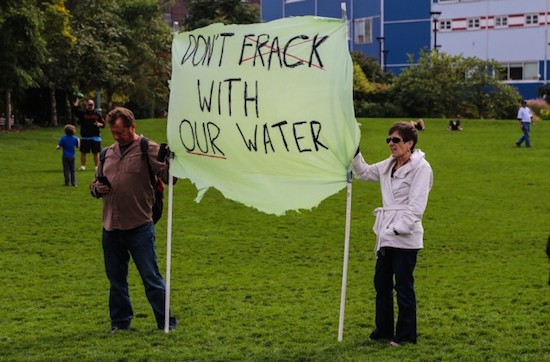• Senator Gipson Joins Fight to Keep Fracking Wastewater Out of NY
Senate Democrats in New York are renewing efforts to protect the state from the byproducts of the fracking boom in Pennsylvania. A new four-bill package would ban the waste from being used to de-ice roads and bar treatment facilities and landfills from accepting waste leftover from the drilling technique.
There are no active fracking operations in New York as the state is still involved in an extensive review of the impacts of permitting the practice, but landfills in New York currently accept fracking waste from other states and the salty brine wastewater is widely used in the state to help melt ice off roads.
“It makes no sense to me to allow the waste product from this process in Pennsylvania to be transported here,” Sen. Cecilia Tkaczyk, sponsor of a bill (S.5123-A) to prohibit the transportation of fracking waste into the state for treatment, disposal or storage told theLegislative Gazette.
Fracking is a drilling technique which uses sand, water, and chemicals injected at high pressures to blast open shale rock and release the trapped gas inside. The process produces millions of gallons of waste containing a cocktail of chemicals and naturally occurring radioactive material. The exact composition of fracking fluid is considered a trade secret in most states and is not public information.
In 2012, Pennsylvania produced 1.2 billion gallons of fracking wastewater. Much of that waste got shipped out of state to neighboring Ohio, which has experienced a dramaticincrease in seismic activity in part related to wastewater that is injected deep underground for storage.
In addition to Sen. Tkaczyk’s bill, Sen. Terry Gipson has introduced legislation that would outlaw the use of fracking waste products on roads and a bill that would ban water treatment facilities and landfills from accepting fracking waste. Sen. Liz Krueger has also introduced legislation that would make it illegal to sell liquid fracking waste.
“We have seen bills like these die before,” said Misti Duvall, a staff attorney with Riverkeeper NY. “But there is momentum building behind this movement. There are now over a dozen counties in New York which have imposed local bans on fracking waste and about half of those have happened in the last year. People care about this issue and it’s time state legislation reflected that.”
New York is not the only state trying to keep fracking waste out.
Earlier this month, the Connecticut Senate approved a three-year moratorium on hydraulic fracturing wastewater as part of a bipartisan bill. The bill was a far cry from the hoped-for indefinite banning of the byproducts and was not voted on by the House before the legislative session ended.
Meanwhile in New Jersey, the Senate recently overwhelmingly approved a bipartisan bill that would put the state off-limits to fracking wastewater treatment and disposal. It also prohibits the use of fracking brine on New Jersey roads. The final vote was 33-4. Identical legislation is pending in the State Assembly.
“This is a victory for clean water,” Jeff Tittel, president of the New Jersey chapter of the Sierra Club told the Star-Ledger. “New Jersey has enough water pollution. We don’t need to bring more in from other states.
This is not the first time the Garden State has tried to insure that New Jersey’s waterways are safe from the byproducts of fracking in neighboring states.
In 2012, the New Jersey Legislature approved a measure prohibiting the treatment, disposal, and storage of fracking wastewater. Gov. Chris Christie vetoed it on the grounds that fracking wasn’t happening in the state and was unlikely to in the near future, reasoning that legislating wastewater was premature. At the time he also said that such a bill would never stand up to legal challenges as it violated the Constitution’s commerce clause that says states shouldn’t pass laws that discriminate against one another.
Gov. Christie’s first objection, at least, now appears to be unfounded as DuPont Co.’s Chambers Works facility in Salem County and other facilities in Elizabeth and Carteret have already accepted fracking waste.
Even if Gov. Christie vetoes the latest reincarnation of the fracking wastewater ban bill, it is conceivable that lawmakers could override that veto. The bill passed the Senate with even more support than the earlier iteration.
In 2012, Vermont became the first state to ban fracking and fracking wastewater.Massachusetts is also considering legislation that would impose a 10-year moratorium on fracking and would ban wastewater from treatment, storage or disposal in the state.
Like most of the states considering laws to keep fracking wastewater out, neither Vermont nor Massachusetts have significant natural gas resources. Supporters of the bans argue that states which don’t produce the waste and don’t benefit from fracking-related jobs, shouldn’t be expected to deal with the waste, while opponents of the ban say that every state which benefits from cheap natural gas should share the burden of managing the byproducts.
_____________________________________________________________________________________________

